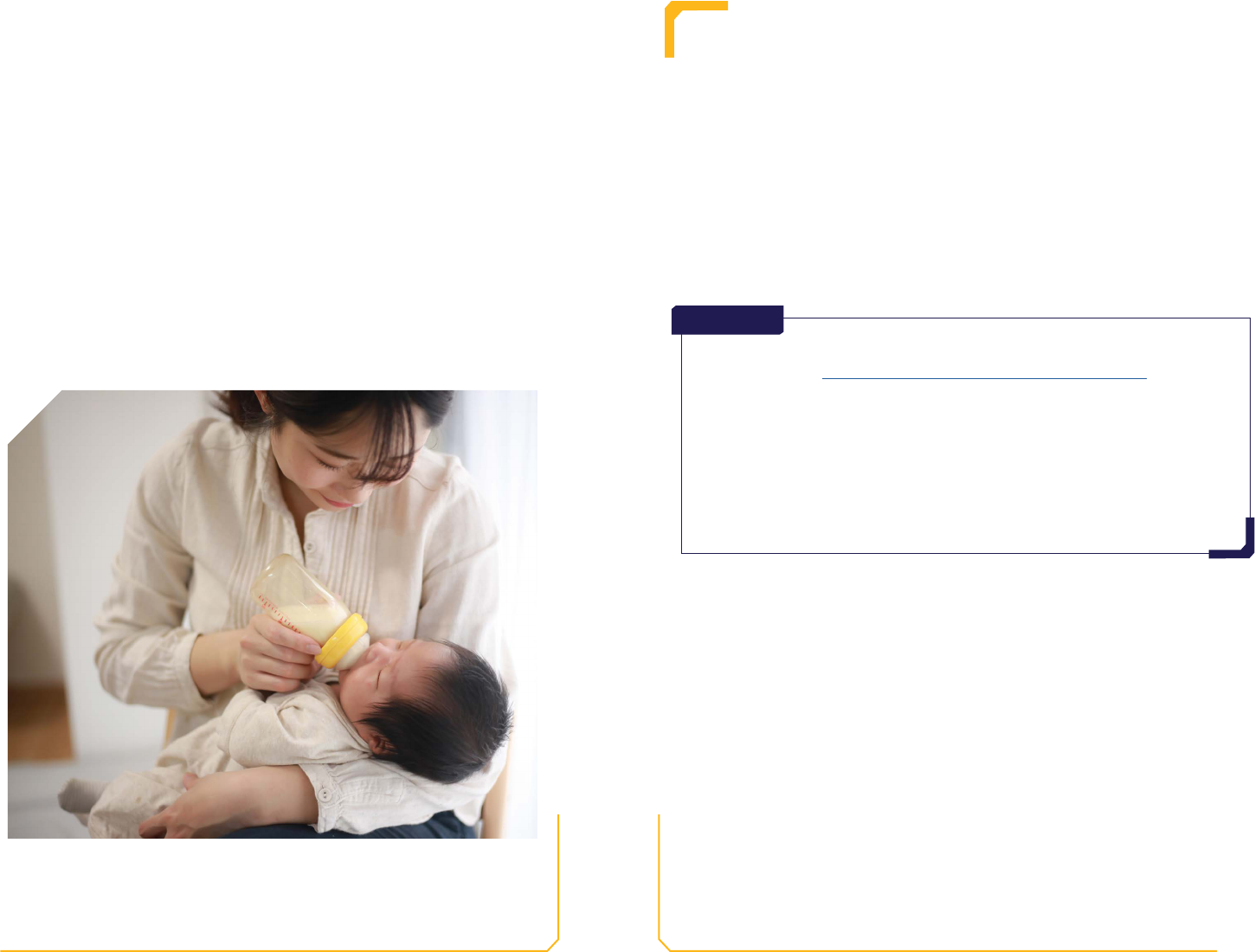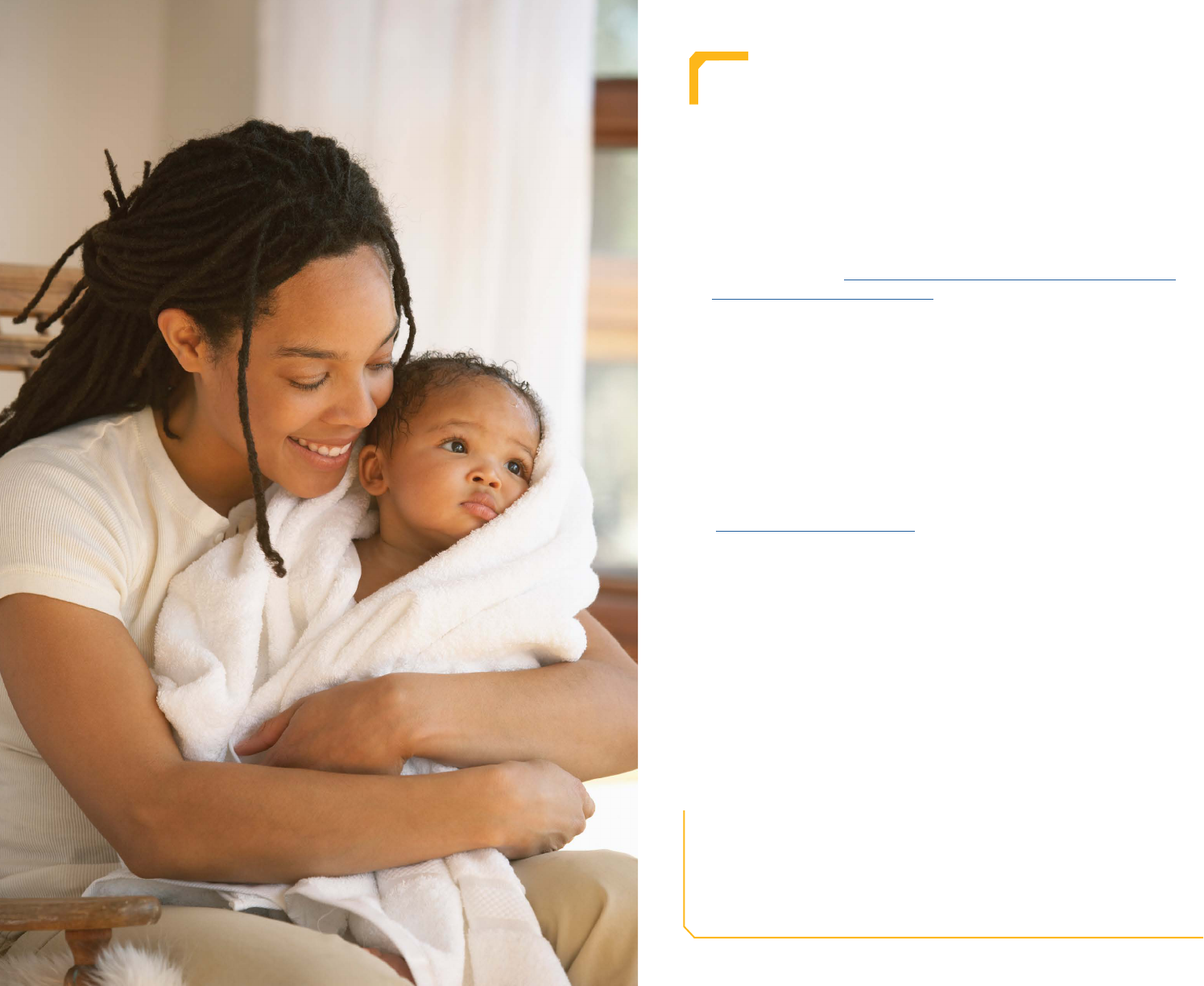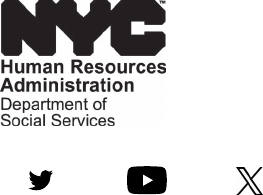
I
CHILD SUPPORT HANDBOOK
For Custodial Parents
CHILD SUPPORT
SERVICES
BK-5 (E)

Introduction..................................................................................1
The Child Support Program..........................................................4
The child support program puts children rst and recognizes that
both parents have an important role in supporting their children.
When children receive nancial support and positive parenting from
both parents they are better off. The program is successful and
effective at establishing parentage, collecting child support income,
and connecting noncustodial parents to employment.
This section of the handbook explains:
• Enrolling in Child Support
• Locating the Noncustodial Parent
• Establishing Parentage
• Serving a Summons
• Going to Court
• Child Support and Medical Support Orders
• Collecting Child Support Payments
• Enforcing the Child Support Order
• Changing the Amount of the Child Support Order
• Terminating the Child Support Order
Divorce and Child Support..........................................................15
The child support process differs for parents who are divorcing or
have divorced.
Custody and Visitation................................................................17
Custody and visitation are not discussed during a child support
hearing. Custody and visitation is a separate court process. Parents
can also discuss custody and visitation using a mediation service.
Domestic Violence and Child Support........................................18
Aspects of the child support program could be triggers for domestic
violence. To learn more about the program and whether it is the right
decision for you, go to https://on.nyc.gov/child-support-safely. If
you have concerns about your or your children’s safety, let your child
support caseworker or Job Opportunity Specialist (JOS) know. You
may be excused from the child support requirement for receiving
public assistance. The child support program and the court can put
domestic violence safeguards in place to ensure the privacy of your
child support case information and your security in court.
A GUIDE TO THIS HANDBOOK
I

1
Information For Cash Assistance and Medical Assistance
Clients..........................................................................................20
You are required to cooperate with the Ofce of Child Support
Services to get full public assistance benets for your family.
This section of the handbook explains:
• Documents You Will Need
• Cooperating with Child Support
• Going to Court
• Foster Care
• How Much Child Support You Can Get
• Getting Child Support Once You Leave Public Assistance
Child Support Contact Information.............................................24
Child Support Ofce Locations....................................................25
Sample Child Support Order........................................................28
Glossary of Child Support Terms.................................................30
INTRODUCTION
The Ofce of Child Support Services (OCSS) works with New York
City families, regardless of income or immigration status, to ensure
that children receive nancial support from both parents. OCSS
helps the custodial parent (parent, relative, or guardian who lives
with and is the primary caretaker of a minor child) to understand
the child support program and provides services throughout
the process. OCSS assists the noncustodial parent (parent who
does not live with and is not the primary caretaker of a minor
child) by offering programs to help them meet their child support
obligations and manage their child support cases.
The child support program is not the same as the Family Court.
Although they work closely and share the same goal of improving
the lives of New York City children through the formal child support
program, they are two different organizations, with different
functions.
OCSS is part of the Human Resources Administration (HRA), an
agency under New York City’s Department of Social Services (DSS).
Parents start the child support process by ling an enrollment form
for services or being referred from Cash Assistance. OCSS will
locate the noncustodial parent, serve a summons, and establish
parentage. After the child support order is established in Family
Court, OCSS monitors, collects, and distributes the payments. If
payments fall behind, OCSS has the authority to enforce the child
support order through administrative means.
FAMILY COURT is part of the New York State Unied Court System.
The Court’s role in the child support process starts when a parent,
guardian, or the New York City Department of Social Services (DSS)
les a petition for parentage and/or child support. The court is
responsible for establishing new child support and medical support
orders and for modifying existing ones. If payments fall behind, a
violation petition may be led in court. When that happens, the
court has the authority to enforce the child support order through
judicial means.
Introduction
II

3
2
CHILD SUPPORT IS IMPORTANT
The noncustodial parent is obligated to pay support until the child
emancipates (most often when they reach age 21). Child support
payments can help you meet your child’s daily needs and provide
your child with a more secure nancial future. Most noncustodial
parents want to engage with their children beyond providing
nancial support and those who pay child support are more likely
to take an interest in their children’s lives and spend more time
with them. Their children tend to have better social outcomes; they
stay in school longer, get better grades, and have fewer behavioral
problems.
Even if the noncustodial parent cannot afford to pay child
support right now, you should still get a child support order. And
if parentage is not established, that is an important rst step.
Establishing parentage in and of itself is in your child’s best interest
because it gives your child the right to Social Security, death, and
military benets and access to medical information.
The child support order will be based on current income but can be
changed in the future if circumstances change. If an noncustodial
parent is not working, the Support Magistrate will establish a
poverty order ($25 per month or $0 per month and cap arrears
at $500). OCSS has employment programs to assist those who
cannot afford to pay child support because they are unemployed
or have low-paying jobs. The Support Magistrate may require an
unemployed noncustodial parent to seek employment or participate
in an employment program at the time of establishing the order.
Once the noncustodial parent starts to get paid on a regular basis,
OCSS can automatically collect child support payments from his or
her paycheck and forward them to the custodial parent. If the order
is $0 then nothing can be collected until the order is modied.
In 2021, OCSS implemented two agreement programs. They allow
parents to have a conversation outside of court about the child
support order amount prior to a court hearing. One program is
to establish the amount of the order and the other is to modify,
or change, an existing order. Parents who meet the qualications
can enter into a agreement by having a conversation with a child
support worker. Both parents do not have to be on the phone or
present at the same time.
• A agreement is prepared with an OCSS representative and using
the same rules as the Court.
• The agreement is submitted to Court for approval and
converted to an order on consent.
• The Court requires both parents to attend at least one hearing
to ensure they voluntarily participated in the process and
understand their rights and responsibilities.
• These two programs offer parents an alternative approach to
establishing and modifying child support orders, which should
reduce the number of court hearings, empowering parents and
make the process more parent-friendly than the usual process.
Introduction

5
4
THE CHILD SUPPORT PROCESS
ENROLLING IN CHILD SUPPORT SERVICES
Custodial parents who are applying for or receiving cash assistance
or Medical Assistance Only (MAO) are automatically referred to an
OCSS Borough Ofce for child support services. Cooperating with
child support is required to get full cash benets and/or Medicaid
for their household.
Custodial parents who are not applying for or receiving cash
assistance or MAO can apply for child support services as follows:
• Through the child support mobile app nyc.gov/childsupportmobile
(to download the app go to the App Store or Google Play);
• In person at the OCSS Family Court Support Services (FCSS)
Ofce located (https://on.nyc.gov/contactocss) in the Family
Court in the borough where they live;
• Download the enrollment form at www.nyc.gov/hra/ocss and
then mail a completed, signed enrollment form to OCSS or email
it to [email protected].us with subject “Child Support
Enrollment Form.”
Any adult who is living with and caring for a minor child may enroll in
child support services. It is not necessary to have legal custody.
OCSS will need documents that help locate the noncustodial parent
and prove your relationship and your child’s relationship to the
noncustodial parent. Provide as much of the following information
as you can:
• Noncustodial parent’s Social Security number or Individual
Taxpayer Identication Number (ITIN)
• Birth certicate for each child to be listed on the petition
• Marriage certicate, divorce decree, or separation papers, if
applicable
• Acknowledgment of Parentage or Order of Filiation from Family
Court, if applicable
• Noncustodial parent’s address and phone number(s)
• Name and address of noncustodial parent’s employer
• Recent photograph
If you don’t know the whereabouts or Social Security number or ITIN of the
noncustodial parent, provide the following information to help us identify
and locate him or her:
• Date and place of birth
• Last known address
• His or her parents’ names (including the mother’s maiden name)
LOCATING THE NONCUSTODIAL PARENT
Many custodial parents know where the other parent lives or works.
If that information is not available, OCSS will search computer
databases to nd the noncustodial parent’s current address and
employer.
The noncustodial parent may be the father or the mother. In cases
in which the person taking care of the child is not a biological
parent, both the mother and father are considered noncustodial
parents who are obligated to pay child support. OCSS can locate
missing parents who live or work in other states. Let us know
immediately if you learn new information that will help us locate the
noncustodial parent.
ESTABLISHING PARENTAGE
When a child is born to unmarried parents, parentage must be
established before a child support order can be issued:
• Establishing parentage gives your child benets that may include
Social Security, military allowance, pension, child support, health
insurance, and the right to inherit from the other parent.
• Parentage can be established in the hospital as soon as the
baby is born, or any time before reaching age 21. If both
parents agree, they can sign an Acknowledgment of Parentage
(AOP) form, which becomes a legal document once it is led
with the Department of Health and Mental Hygiene (DOHMH).
Parentage can also be established at a hearing in Family Court.
Either parent can le a petition for a parentage hearing.
• If there is a question about the identity of the other parent, low-
cost DNA testing (https://bit.ly/ocssdnatest) is available through
New York State-certied laboratories. For more information
and a referral, contact the OCSS DNA Line at 929-221-5008. If
you have a scheduled date to appear in Family Court for a child
support hearing, you cannot request low cost DNA testing on
your own. The Support Magistrate will order a DNA test if it is
needed to establish parentage.
The Child Support Program

7
6
SERVING A SUMMONS
After a petition for parentage and/or child support is led, the
noncustodial parent must be notied by summons of the date and
time of the child support hearing and the requirement to show up.
Upon request, OCSS will provide summons service, usually by mail,
at no cost to you. If you prefer, you may handle it on your own by
having someone you know serve the summons. You may not serve
the summons yourself.
GOING TO COURT
How You Can Bring An Agreement To Court
Custodial and noncustodial parents will be given the opportunity to
enter into a agreement voluntarily before appearing in Court. This
type of agreement is based on the child support standard guidelines
used by the Court but would be discussed by the parent or parents
with an Ofce of Child Support Services (OCSS) customer service
representative. It is an alternative to a formal court proceeding and
is designed to be friendly and supportive, allowing both parents the
opportunity to talk.
For an agreement:
• An OCSS worker drafts the agreement according to the
guidelines and helps the parents gather the required documents.
• The approved agreement package is led in Court for a hearing
to be scheduled.
• Usually only one Court appearance would be required for the
Support Magistrate to make sure the parents voluntarily entered
into the agreement and to approve the agreement as an order on
consent.
If you are interested in learning more about entering into a agreement,
call 1-929 -252-5289 or email [email protected].us with subject
“CSSAP” to schedule an appointment and learn more.
How Much Money Will I Receive?
The amount of child support income received is based on the child
support obligation set by the Court. Provided the noncustodial
parent pays, the full amount of child support income is distributed
to custodial parents, unless they are receiving cash assistance. For
cash assistance clients, they receive up to $100 in child support
income with one child and $200 with two children, above their cash
assistance benet amount. In those situations where a child resides
in Foster Care, all of the child support income is retained by the DSS.
How Long Does The Process Take Before Payment Is Received?
The entire process from the point of enrolling in services to
obtaining a court order can take many months, if the location
of the noncustodial parent is known. If the noncustodial parent
is employed, an Income Withholding Order (IWO) is sent to the
employer and child support payments can generally be expected to
arrive within a month of the employer receiving the IWO.
What You Need To Know About Your Court Hearing
In Court, the Support Magistrate will listen to testimony and
review the income and expense information of both parents.
That information will be used to calculate how much support the
noncustodial parent must provide.
• Family court is set up so that you can represent yourself. You
do not need a lawyer, but you may hire one if you wish. There
are a few low-cost options (https://on.nyc.gov/low-cost-legal)
available.
• Both parents must show up at the hearing. When both parents
come prepared with their nancial documents, there may be
fewer hearings. If the noncustodial parent does not show up at
the hearing or does not provide enough information about his
or her income, the Support Magistrate may adjourn the hearing
and reschedule it for another date. In that case, the custodial
parent must show up at the next court hearing or the case may
be dismissed. The Support Magistrate may proceed without the
noncustodial parent present and establish a default order if there
is proof of summons service.
• If either parent disagrees with the child support order, a written
objection may be led with the Court Clerk’s ofce within 30 days
of the date of the order or within 35 days of the date the order
was mailed to the parties. The other parent will have a chance to
answer the objection. A Family Court judge will review the case
le and make a decision.
Documents You Will Need
• Completed Financial Disclosure Afdavit (https://bit.ly/
FinDisclosure)
• Proof of income and assets such as pay stubs, tax returns, bank
accounts, and investments and property holdings
• Proof of household expenses such as rent and food
• Proof of medical, child care, and education costs
The Child Support Program

9
8
Presenting Yourself In Court
• Arrive on time
• Dress appropriately
• Come with a prepared list of important points and stick to them
since time is limited
• Come with your Financial Afdavit completed and any other
supporting documentation
• Speak when it is your turn; do not speak directly to the other
parent.
CHILD SUPPORT AND MEDICAL SUPPORT ORDERS
In order to make child support orders in New York State fair and
consistent, the Child Support Standards Act sets the basic child
support amount at a xed percentage of the parents’ income.
Unless there are documented reasons not to, the Support
Magistrate must use these percentages in deciding how much
child support the noncustodial parent has to pay. Using these
percentages ensures that children benet from the same standard
of living they would have if their parents were living together. The
law does allow Support Magistrates some exibility to deviate in
accordance with the reasons identied in the law.
How The Amount Of The Order Is Calculated
Under the law, the basic support amount that the noncustodial
parent has to pay is a percentage of his or her gross income minus
NYC taxes, Social Security and Medicare deductions, and any child
or spousal support actually paid to another family, and depends on
how many children are involved.
Income includes salary from a job, worker’s compensation, disability
payments, unemployment benets, Social Security payments, and
many other forms of income. It does not include cash assistance or
Supplemental Security Income (SSI) benets.
This percentage is used for all cases in which the parents’ combined
income does not exceed $163,000. For combined income above
$163,000, the Support Magistrate can choose whether or not to use
the percentage guidelines and may consider other information in
setting the full support amount.
There are protections in the law for low-income noncustodial
parents. Those earning less than the New York State Self-Support
Reserve can obtain a $50 a month order, and those earning at or
below the federal poverty level can obtain a poverty order of $25
per month and have arrears capped at $500. The point is there
is value in establishing an order. OCSS will work with low-income
noncustodial parents to connect them to employment services.
When their income increases, there is an opportunity to have the
order increase.
OCSS provides an online calculator (http://bit.ly/CSCalc) that can
give you an idea about how much child support may be ordered.
What The Child Support Order Includes
• Obligation amount based on the New York State Child Support
Standards Act.
• Medical support, which includes health care costs for the child
like health insurance premiums, deductibles, and co-payments.
Medical support costs are divided between the two parents,
according to their incomes. Either parent may be required to
enroll the child in a health insurance plan if it is available through
his or her job. The insurance must be available at a reasonable
cost to the employee and the medical services must be available
where the child lives.
• Reasonable education and child care expenses for the child may
also be included in the child support order. These expenses are
usually divided between the two parents, according to their
incomes. Both medical and education expenses, if included, are
in addition to the basic child support order amount.
1 child…………17%
2 children………25%
3 children………29%
4 children………31%
5 or more………at least 35%
The Child Support Program

11
10
COLLECTING CHILD SUPPORT PAYMENTS
Your child support order will be made payable to the OCSS Support
Collection Unit (SCU). We will collect the noncustodial parent’s
payments on a regular basis, usually through payroll deductions.
The child support payments will be forwarded to you electronically,
by direct deposit to your bank, or through the New York State
Debit MasterCard program. Checks will be sent only in hardship
cases. For direct deposit into your savings or checking account, you
can complete, sign, and return the form at childsupport.ny.gov. You
can watch the video on how to ll out the direct deposit enrollment
form at the HRA OCSS YouTube playlist at (youtube.com/hranyc).
If you do not enroll in direct deposit, you will receive your child
support payments through the New York State debit card.
If you move, it is important to give OCSS your new address
https://on.nyc.gov/3FAiB0S so that we can contact you and
ensure that you do not miss any payments or other important
correspondence.
You may be charged an annual service fee of $35. The fee applies
only to custodial parents who have never received cash assistance
benets in any state. The fee will be charged if at least $550 in
support is collected for you during the federal scal year (October
1–September 30). The fee will continue to apply in each federal
scal year when $550 or more is collected.
OCSS cannot provide collection and enforcement services if you
have an order that is payable directly to you. You may request a
Change of Payee from Direct Payment to Payable through the
Support Collection Unit (SCU) https://on.nyc.gov/3TNqXXv at the
OCSS Family Court Support Services (FCSS) Ofce in the Family
Court in your borough. A Change of Payee can be done on any
child support order issued by New York State Family Court or
Supreme Court without a court hearing.
ENFORCING THE CHILD SUPPORT ORDER
Enforcement means taking appropriate actions to collect past-
due child support and ensure current and future payments. The
enforcement process begins when the order is made payable to
the Support Collection Unit (SCU) and ends when the order is
terminated and any arrears are paid up. When payments fall behind,
a number of enforcement tools can be used to collect what’s owed.
Some enforcement actions are administrative. This means that a
court hearing is not required. OCSS has the authority to enforce
orders using these methods, including:
• Increasing the wage garnishment amount by 50% to reduce the
child support debt (arrears)
• Seizing money from bank accounts, income tax refunds, lottery
winnings, and insurance settlements
• Suspending driver license
• Reporting unpaid child support to credit reporting agencies
• Referring cases to the New York State Department of Taxation
and Finance for collection of child support debt
• Denying new and renewed passports
• Denying new and renewed New York City business and
professional licenses, permits, registrations, and certicates.
NYC licensing agencies include, but are not limited to, the Taxi and
Limousine Commission, the Department of Consumer Affairs, the Fire
Department, and the Police Department
Other enforcement actions are judicial. This means that a court
hearing is necessary. If you are not receiving cash assistance,
you would have to le a violation petition. Judicial enforcement
methods include:
• A violation hearing. This may result in any of the following:
• Money judgment with interest added on (mandated by law for
all violation hearings)
• Lien on any owned property
• Cash undertaking (cash deposit up to three years’ worth of
child support payments) to guarantee payment of future child
support
• Participation in an employment program
• Suspension of state-issued professional, business, and
recreational licenses. State licensing agencies include, but
are not limited to, the Departments of Education, State,
and Environmental Conservation, the Ofce of Court
Administration, and the Liquor Authority
• Incarceration
• Referral for criminal prosecution
The Child Support Program

13
12
CHANGING THE AMOUNT OF THE CHILD SUPPORT ORDER
Changing The Amount Through Family Court
Either parent may le a petition in Family Court to modify (change)
the amount of the child support order if there is a substantial
change in circumstances, which may be dened as a considerable
and unplanned change in circumstances, or the needs of the child
are not being met. The Support Magistrate will review the new
information presented and decide if a change should be made.
The following additional standards for modication apply to child
support orders established on or after October 13, 2010.
• Three years have passed since the order was entered, last
modied, or adjusted.
• There has been a change in either parent’s gross income by 15%
or more since the order was entered, last modied, or adjusted.
Any decrease in income must be involuntary and the parent
claiming decreased income must have made diligent attempts
to nd work commensurate with his or her education, ability,
and experience.
• Incarcerated individuals may le a modication petition due
to a substantial change in circumstances as long as their
incarceration is not due to nonpayment of child support or an
offense against the custodial parent or child.
• Any change to the order will go back to the date that the
petition was led in court, not the date that the change in
circumstances took place.
Modifying Orders Through Stipulation (MOTS)
An alternative to the longer Court process for changing a child
support order is a agreement between the custodial parent and
the noncustodial parent, which can be facilitated by OCSS. This
program, called Modifying Orders Through Stipulation (MOTS),
typically requires one brief Court hearing appearance that results in
a child support order on consent, which is an order that has been
agreed to by both parties.
MOTS offers both custodial and noncustodial parents the
opportunity to discuss, ask questions, and come to an agreement
on the new child support obligation amount. This is accomplished
with a child support worker, outside of Family Court, using the
same guidelines as the Court. Once an agreement is reached and
both parents sign it, a Court hearing is scheduled. The parents need
to appear but, usually, only once.
Changing The Order Amount Through A Cost Of Living
Adjustment (COLA)
Child support orders may be increased with a Cost of Living
Adjustment (COLA) without going back to court. Only custodial
parents whose child support orders are paid through OCSS can get
a COLA. The amount of the COLA is based on yearly changes in
the consumer price index for urban areas (CPI-U), which tracks the
prices of items like food, clothing, housing, transportation, fuel, and
medical expenses.
A COLA may be added to a child support order when the yearly
increases in the CPI-U add up to at least 10% from the date the
order was established or last modied. It can take several years
to reach the required 10% increase in the CPI-U. Cash assistance
clients automatically receive the COLA when their child support
cases become eligible. Non-cash assistance clients are notied by
mail when their cases meet the requirements for a COLA. They
must respond to the notice in order to receive the increase.
Changing The Order When A Child Emancipates
Orders may be allocated. This means a specic dollar amount
is associated with each child. When this happens, as a child
emancipates, the order will automatically be adjusted as each
child emancipates. Some orders are not allocated. In such cases,
both parents/guardians need to return to Court to have the order
modied to reect the emancipation of the child.
TERMINATING THE CHILD SUPPORT ORDER
In New York State, the noncustodial parent is obligated to pay
support until the child emancipates (typically when they reach age
21). When the youngest child on a case turns 21, nothing needs to
be done to terminate the order – it happens automatically. Under
certain circumstances, child support orders may be terminated by
the court before age 21 when:
• The child becomes emancipated–moves out and becomes self-
supporting, gets married, or joins the military.
• The noncustodial parent gets custody of the child. In that case,
the noncustodial parent must le a petition to terminate the
order and establish a new order against the former custodial
parent.
The Child Support Program

15
14
• You get back together with the other parent and form one
household. Again, a petition must be led with the court to
terminate the order.
Once the order is terminated, you may still be entitled to receive
child support if the noncustodial parent’s payments were not up to
date and he or she owes arrears.
In New York State, divorce cases are heard in Supreme Court. A
divorce decree, stating the terms of the divorce, is issued. The
divorce decree may include a child support order. The amount of
the child support order can be decided between the two parents
and their lawyers, or the Supreme Court judge hearing the case.
If the judge determines the obligation amount, he or she will base
the order on the same New York State Child Support Standards
Act used in Family Court. You can request to have the child support
order payable to OCSS and use our services for collecting and
enforcing payments.
To do this:
1. Complete the Child Support Enrollment Form (LDSS-5258) found at nyc.gov/
hra/ocss, or at https://otda.ny.gov/programs/applications/5258.pdf
2. MAIL the LDSS-5258, a complete copy of the divorce decree, and indicate you
want to convert it so that it’s payable to OCSS. Mail the package to:
OCSS, c/o Accounts Maintenance Director
PO Box 830
Canal Street Station
New York, NY 10013
OR
Bring your divorce degree to the OCSS Family Court Support Services (FCSS) Ofce
in the Family Court in your borough and enroll in child support services in person.
This will ensure the divorce degree is converted to an order payable to OCSS.
The support order amount will be entered into our computer
system as it appears in your Supreme Court divorce decree. Either
parent may le a petition to modify the child support order if their
circumstances or the needs of the child change. If your divorce
decree states that Supreme Court retains jurisdiction, then you must
go back to Supreme Court to request the modication. If the order
states that Supreme Court grants concurrent jurisdiction to Family
Court, or does not mention jurisdiction at all, you may go back to
either court.
You can go directly to Family Court to enroll for child support
services if you have a divorce decree that does not include a child
support order or you have not started the divorce process in
Supreme Court yet. Once you have led papers in Supreme Court
and have a date for an upcoming hearing, you cannot request a
child support hearing in Family Court until the other court matter is
resolved.
Divorce and Child Support
DIVORCE AND CHILD SUPPORT

17
16
CUSTODY AND VISITATION
Custody and visitation are not discussed at the child support
hearing and are not included in the child support order.
OCSS believes that noncustodial parents are more likely to
pay child support if both parents/guardians have a verbal or
written agreement in place for seeing their children and/or
sharing responsibilities. A parent who needs help with custody
and visitation may le a petition in court for a custody and
visitation hearing (http://ww2.nycourts.gov/COURTS/nyc/family/
faqscustodyandvisitation.shtml). At the hearing, a judge or referee
may refer the parents to mediation services. If a satisfactory
agreement is reached through this court-referred mediation
process, the judge or referee will make the agreement into a court
order. If an agreement is not reached, the case will be returned to
the court and the judge or referee will decide how to resolve
the issues.
TRYING MEDIATION TO RESOLVE YOUR DIFFERENCES
Mediation services are also available without a court referral
to discuss child rearing issues. Parents may contact any of the
following organizations directly for free or low-cost mediation
(https://bit.ly/ocssmediation) services:
• Center For Mediation And Training: 212-799-4302 (all clients,
hourly fee)
• Community Mediation Services: 718-523-6868 (Queens
residents)
• Institute For Mediation And Conict Resolution: 718-585-1190
(Bronx residents)
• New York Legal Assistance Group: [email protected]g (low-
income clients)
• New York Peace Institute: 212-577-1740, 718-834-6671
(Brooklyn and Manhattan residents)
• Parent Help: 800-716-3468 (federally funded program offering a
free and condential telephone helpline to mothers and fathers
living apart)
Custody and Visitation

19
18
DOMESTIC VIOLENCE AND
CHILD SUPPORT
When most people hear the words “domestic violence,” they
think of physical violence. However, in some cases, abusers never
physically attack their victims. Other forms of abuse or ways to
control victims include emotional, sexual, and nancial abuse.
Many abusers use money as a means of control. An abuser can
deny a victim access to money, or housing, or a car, making it
difcult to leave or stay away. Abusers can use threats about child
support to control their victims. In addition to threatening physical
violence, an abuser may say you will never see a dime of child
support if you leave or that you will lose custody if you ask for child
support.
If you have any concerns, please take a moment to read
Information for All Child Support Applicants About Getting Child
Support Safely (W-280a) https://on.nyc.gov/child-support-safely
available on our website at www.nyc.gov/hra/ocss. This document
describes the services we provide that could become triggers for
domestic violence. If you still wish to pursue child support, there
are ways to do so safely.
If you are applying for or receiving cash assistance, you are
required to cooperate with child support to get full benets for
your family. But if there is a danger of domestic violence, you
should tell the Job Opportunity Specialist (JOS) in the Job Center
or the child support caseworker of your fears and you may be
excused from that requirement.
If you are not applying for or receiving cash assistance and there
is danger of domestic violence, you can decide if you want child
support services. Many survivors of domestic violence are nervous
about collecting child support but want to go forward with a
support case because they need the money. Regardless of the
situation, many feel that both parents should be responsible for the
children they have together. If you decide to go forward, you can
always change your mind.
• When you go to court to le a petition for child support, let
the child support worker and State Family Court staff know of
your fears. They will work with you to ensure the privacy of case
information and security in the court. You can request that the
court:
» Remove your address and employment information
from petitions, notices, and any other court forms
» Not tell the other parent where you live or work
» Allow you to leave the court separately from the other
parent
» Order that any DNA testing needed to establish
parentage be conducted on different dates
» Refer you to domestic violence services
• Once you have a child support order, OCSS can provide
administrative enforcement without your involvement. If your
situation becomes dangerous and you are concerned for your
safety or that of your children, you can ask OCSS to close your
case at any time.
If you are experiencing domestic violence, or know someone who
is, help is available. The New York City Domestic Violence Hotline
(800-621-HOPE) provides information on counseling, shelters,
services for children, and legal assistance.
Domestic Violence and Child Support

21
20
You will be scheduled for an interview with an Ofce of Child
Support Services (OCSS) Borough Ofce if you are applying for
or receiving cash assistance or Medical Assistance Only (MAO), or
need to have a child added to your cash assistance case. At the
interview, a child support worker will ask you questions about the
noncustodial parent (parent living outside of the household). Your
benets may be reduced if you fail to keep your appointment or fail
to provide documentation and information about the noncustodial
parent.
DOCUMENTS YOU WILL NEED
Documents and information you will need for your OCSS Borough
Ofce interview:
• Completed referral that you were given along with the
appointment notice (copies can be found at www.nyc.gov/hra/
ocss)
• Noncustodial parent’s Social Security number or Individual
Taxpayer Identication Number (ITIN)
• Birth certicate for each child to be listed on the petition
• Marriage certicate, divorce decree, or separation papers, if
applicable
• Acknowledgment of Parentage or Order of Filiation from Family
Court, if applicable
• Noncustodial parent’s address and phone number(s)
• Name and address of noncustodial parent’s employer
• Recent photograph
If you don’t know the whereabouts or Social Security number or ITIN of
the noncustodial parent, the following information will help us identify and
locate him or her:
• Date and place of birth
• Last known address
• His or her parents’ names (including the mother’s maiden name)
COOPERATING WITH CHILD SUPPORT
If you are receiving or applying for cash assistance, you are
required to cooperate with OCSS in order to get full benets for
your family. If you fail to provide the information requested, you
may be sanctioned, which means your Cash Assistance benet
may be reduced by 25%, you may lose Medicaid for yourself, you
may become ineligible for some rental assistance programs or
have your rental supplement reduced, and the sanction will remain
in effect unless and until you provide the specic information
requested and comply with child support.
In some situations, there are good reasons not to cooperate. You
may be allowed a good cause claim for the following reasons:
• You fear physical or emotional abuse from the other parent for
yourself or your child(ren)
• Your child came from a pregnancy due to incest or rape
• You are working with an adoption agency to have your child
adopted
Let the child support worker know if one of these situations applies
to you. You will be referred to a domestic violence counselor if your
claim is a result of physical or emotional abuse. The counselor will
decide if you have good cause and are eligible for a full or partial
waiver, which means you may not have to cooperate with some or
all of the child support requirements right now.
If you are sanctioned for non-compliance, your sanction can be
lifted at any time by providing the specic information requested
and comply with child support. You can also reach out to OCSS
Borough Ofce (https://on.nyc.gov/contactocss) and cooperate.
INFORMATION FOR CASH ASSISTANCE
AND MEDICAL ASSISTANCE CLIENTS
Information For Cash Assistance and Medical Assistance Clients

23
22
GOING TO COURT
You will be expected to attend the child support hearing if/when
your case is referred to court. There will be a lawyer at the hearing
to represent the New York City Department of Social Services/
Human Resources Administration (HRA), the agency that les the
petition on behalf of children who are on cash assistance. But
you should still be prepared to answer some questions. If your
cash assistance or Medical Assistance Only case closes before
the hearing date, you should still go to the hearing. The Support
Magistrate can establish parentage and/or a child support order if
both parents are there.
You may be eligible to participate in the Child Support Stipulation
Agreement Program (CSSAP). CSSAP can simplify the child support
process and may reduce the time you spend in Family Court. Call
“CSSAP” to schedule an appointment and learn more.
FOSTER CARE
If your child is in foster care, you assign your rights to the child
support income collected to the Department of Social Services/
Administration for Children’s Services. Once you are reunited with
your child, the child support income is directed to you, unless
you are receiving cash assistance. If so, the cash assistance rules
apply, meaning you receive the rst $100 (or $200 for two or more
children) and the remainder is retained by DSS.
HOW MUCH CHILD SUPPORT YOU CAN GET WHILE
RECEIVING CASH ASSISTANCE
• The rst $100 (or $200 for two or more children) collected
each month in current child support will be forwarded to you in
addition to your cash benet. This is your bonus or pass-through
payment and is available on your EBT card. In most cases, the
rest of the money collected is used to pay back HRA for your
cash benets. If you already had a child support order before
applying for cash benets, you may be entitled to “family
arrears payments.” Ask your child support worker if that applies
to you.
• Any child support payments you receive directly from the
noncustodial parent, while you are receiving cash assistance,
must be turned over to HRA. Keeping these child support
payments is considered welfare fraud.
• If the amount of child support collected is more than your
benets, you may be able to close your cash assistance case and
still be entitled to SNAP benets (food stamps), Earned Income
Tax Credit (EITC), child care, and Medicaid benets.
GETTING CHILD SUPPORT ONCE YOU LEAVE CASH ASSISTANCE
• Once you are no longer receiving cash assistance or Medical
Assistance Only (MAO), all payments from the noncustodial
parent for current child support will be forwarded to you. We will
continue to make sure that payments are made regularly and on
time, at no cost to you.
• In some cases, OCSS will still have the right to keep child
support payments owed from the time when your family was
receiving cash assistance. This will only happen after you are paid
everything owed to you based on your child support order or
when income is collected by intercepting state or federal income
tax refunds.
• If you did not have a child support order while you were
receiving cash assistance but now have information that will help
us collect child support for your family, let us know immediately
by calling the New York State Child Support Helpline at 888-
208-4485. If we are able to locate the noncustodial parent, you
will be contacted so you can le a petition in Family Court to
establish an order.
Child support payments–in addition to a job and other supports
such as the Earned Income Tax Credit (EITC), Supplemental
Nutrition Assistance Program (SNAP; also called food stamps),
Medicaid, and subsidized child care–can help you become
nancially independent and support your family.
Information For Cash Assistance and Medical Assistance Clients

25
24
CALL
New York State Child Support Helpline
Speak with a representative
Monday – Friday, 8:00 a.m. – 7:00 p.m.
888-208-4485
866-875-9975 TTY (Hearing Impaired)
New York City Ofce of Child Support
Services DNA Line
Information about low cost DNA
testing.
Monday – Friday, 9:00 a.m. – 5:00 p.m.
929-221-5008
EMAIL
[email protected].us. Please
include your Child Support case
number in your email inquiry.
PHONE APPOINTMENT
Schedule a phone appointment with
a Customer Service caseworker by
emailing [email protected].us.
Please provide your name, Child
Support case number, a description
of your concern(s), phone number,
and the best time to reach you. Enter
“Requesting a Customer Service
Appointment” in the subject line of
your email.
VISIT
New York City Ofce of Child Support
Services
Customer Service Walk-In Center
151 West Broadway, 4th Floor
New York, NY 10013
Monday – Friday, 8:00 a.m. – 6:00 p.m.
(except holidays)
Bring a photo ID
WRITE
New York City Ofce
of Child Support Services
PO Box 830
Canal Street Station
New York, NY 10013
GO ONLINE
New York State Division
of Child Support Services
childsupport.ny.gov
NYC Ofce of Child Support Services
nyc.gov/hra/ocss
*For account information, you will need
the PIN number that you were assigned
for your account, and your Social
Security number. If you do not remember
your PIN, call the Child Support Helpline
at 888-208-4485 to request your PIN.
To verify your identity, you will be asked
to provide your name, account number,
Social Security number, and address.
If you prefer, you can request a PIN by
sending a letter that includes your name,
account number, Social Security number,
address, and signature.
• For general information about the child support program.
• For help with your child support case, including change of address.
• To provide information that will help us collect child support for your family.
MAIL YOUR REQUEST TO THE
FOLLOWING ADDRESS:
Attn: PIN
NYS Child Support Processing Center
PO Box 15365
Albany, NY 12212-5365
CHILD SUPPORT CONTACT INFORMATION
CHILD SUPPORT OFFICE LOCATIONS
TO ENROLL IN CHILD SUPPORT SERVICES
THOSE RECEIVING CASH ASSISTANCE. You will automatically be given
an appointment to speak with an OCSS Borough Ofce child support
worker if you are applying for or receiving cash assistance or Medical
Assistance Only (MAO). Staff are available Monday – Friday, 9:00 a.m. –
5:00 p.m. If you have more information about the noncustodial parent
after your interview, call the ofce where you had your appointment.
BRONX
Bronx Borough Ofce
Serving the Bronx
894 Garrison Avenue
Bronx, NY 10474
929-252-4100
BROOKLYN
Brooklyn Borough Ofce
Serving Brooklyn and the
Rockaways
One MetroTech Center, North, 6th
Floor
Brooklyn, NY 11201
929-221-7620
MANHATTAN
Manhattan Borough Ofce
Serving Manhattan and
Staten Island
115 Chrystie Street, 3rd Floor
New York, NY 10002
212-274-4736
QUEENS
Queens Borough Ofce
Serving Queens (except the
Rockaways)
32-20 Northern Blvd, 6th Floor
Long Island City, NY 11101
929-221-4105
STATEN ISLAND
Staten Island residents receive
services in the Manhattan Borough
Ofce
ALL OTHER APPLICANTS.
Call or visit the Family Court
Support Services Ofce (FCSS)
located in the Family Court in
your borough if you are not
applying for or receiving cash
assistance or Medical Assistance
Only (MAO). All ofces are open
Monday– Friday, 9:00 a.m. – 5:00
p.m. You can also call to schedule
a phone appointment or mail your
completed signed enrollment
form to:
OCSS
c/o Family Court Support
Services Director
PO Box 830
Canal Street Station
New York, NY 10013
Child Support Contact Information and Ofce Locations

27
26
BRONX
Bronx County Family Court
900 Sheridan Avenue, Lower Main Floor
Bronx, NY 10451
718-590-3924/3432
BROOKLYN
Kings County Family Court
330 Jay Street, 12th Floor
Brooklyn, NY 11201
718-246-7962/68
MANHATTAN
New York County Family Court
60 Lafayette Street, 1st Floor
New York, NY 10013
212-385-8218/19
QUEENS
Queens County Family Court
151-20 Jamaica Avenue, 4th Floor
Jamaica, NY 11432
718-725-3148/49
STATEN ISLAND
Richmond County Family Court
18 Richmond Terrace, Basement
Staten Island, NY 10301
718-720-2906
FOR HELP WITH AN EXISTING CHILD SUPPORT CASE.
If you need help with your case once you have a child support order,
including change of address, email us at [email protected].us
Or visit:
OCSS CUSTOMER SERVICE WALK-IN CENTER
151 West Broadway, 4th Floor
New York, NY 10013
Monday – Friday, 8:00 a.m. – 6:00 p.m. (except holidays)
Child Support Ofce Locations

29
28
SAMPLE CHILD SUPPORT ORDER
F.C.A. §§ 413, 416, 433, 438, 4-7 11/2002
439, 440,442-447, 471; Art.5-B,
PRESENT: Family Court, Support Magistrate
In the Matter of a Support Proceeding
Custodial Parent, SSN: XXX-XX-XXXX,
Petitioner,
– against –
Noncustodial Parent, SSN: XXX-XX-XXXX,
Respondent.
NOTICE: YOUR WILLFUL FAILURE TO OBEY THIS ORDER MAY RESULT IN INCARCERATION FOR
CRIMINAL NON-SUPPORT OR CONTEMPT. YOUR FAILURE TO OBEY THIS ORDER MAY RESULT
IN SUSPENSION OF YOUR DRIVER’S LICENSE, STATE-ISSUED PROFESSIONAL, TRADE, BUSINESS
AND OCCUPATIONAL LICENSES AND RECREATIONAL AND SPORTING LICENSES AND PERMITS;
AND IMPOSITION OF REAL OR PERSONAL PROPERTY LIENS.
SPECIFIC WRITTEN OBJECTIONS TO THIS ORDER MAY BE FILED WITH THIS COURT WITHIN 30
DAYS OF THE DATE THE ORDER WAS RECEIVED IN COURT OR BY PERSONAL SERVICE, OR IF
THE ORDER WAS RECEIVED BY MAIL, WITHIN 35 DAYS OF THE MAILING OF THE ORDER.
The above-named Petitioner having led a petition in this Court on June 22, 2004, alleging that
Noncustodial Parent is chargeable with the support of:
Name Date of Birth
Child’s Name XX/XX/XXXX
Noncustodial Parent having appeared before this Court to answer the petition, having been advised
by the Court of the right to counsel, and to show why an order of support and other relief prayed for
in the petition should not be granted; and Noncustodial Parent having admitted the allegations of
the petition; and the matter having duly come on to be heard before this Court;
NOW, after examination and inquiry into the facts and circumstances of the case and after hearing
the proofs and testimony offered in relation thereto, the Court nds that: Noncustodial Parent is the
Noncustodial party, whose pro rata share of the basic child support obligation is $XX.XX weekly for
the following child:
Name Child Date of Birth Social Security #
And the Court nds further that: The Noncustodial party’s pro rata share of the basic child support
obligation is neither unjust nor inappropriate;
Noncustodial Parent is currently unemployed;
NOW, after examination and inquiry into the facts and circumstances of the case and after hearing
the proofs and testimony offered in relation thereto, it is
ORDERED AND ADJUDGED that effective January 28, 2005, Noncustodial Parent is chargeable
with the support of the following person(s) and is possessed of sufcient means and able to earn
such means to provide the payment of the sum $XX.XX weekly to Custodial Parent by certied
check or money order payable to the Support Collection Unit, such payments to commence on Jan-
uary 28, 2005, for and toward the support of Noncustodial Parent’s children, allocated as follows:
At a term of the Family Court of the
State of New York, held in and for the
County of Richmond, at
100 Richmond Terrace, Staten Island, NY
10301, on October 4, 2004
File #: XXXXX
Docket #: F-XXXXX-XX
CSMS #: XXXXXXXXX
ORDER OF SUPPORT
Family Court
Act laws that
govern the
court hearing
Court address
and the hearing
date
Child support case
and court identifying
information
Form number and date of issue
Parties involved
PART
A
PART
B
PART
C
PART
D
PART
E
Type of order
Filing an
objection
Noncustodial parent’s employment status
Effective
date of
the child
support
order
(Your date
will be
different)
The person who will receive the child support payments
Docket No: F-XXXXX-XX
4-7
Name Social Security # Date of Birth Amount
Children
Child XX/XX/XXXX
Total Child Support: $XX.XX weekly
ORDERED that the payor, custodial party and any other individual parties immediately notify the Sup-
port Collection Unit of any changes in the following information: residential and mailing addresses,
social security number, telephone number, driver’s license number; and name, address and telephone
numbers of the parties’ employers and any change in health insurance benets, including any termina-
tion of benets, change in the health insurance benet carrier or premium, or extent and availability
of existing or new benets; and it is further
ORDERED that this Order shall be enforceable pursuant to Section 5241 or 5242 of the Civil Practice
Law and Rules, or in any other manner provided by law; and it is further
ORDERED that Noncustodial Parent pay additional expenses as follows:
Expense/Payee Payment Payable
Unreimbursed Health Related/
Custodial Parent XX % Via SCU
Child Care/
Custodial Parent XX % Direct
IT IS FURTHER ORDERED that all payments payable through the Support
Collection Unit shall be mailed to: Support Collection Unit, PO Box 15363,
Albany, NY 12212- 5363;
IT IS FURTHER ORDERED that a copy of this order be provided promptly by the Support Collection
Unit to the New York State Case Registry of Child Support Orders established pursuant to Section
111-b(4-a) of the Social Services Law; and it is further ORDERED that this is a $XX per week order of
support from 10/8/04 until it increased on1/28/05.
NOTE: (1) THIS ORDER OF CHILD SUPPORT SHALL BE ADJUSTED BY THE APPLICATION OF A
COST OF LIVING ADJUSTMENT AT THE DIRECTION OF THE SUPPORT COLLECTION UNIT NO
EARLIER THAN TWENTY-FOUR MONTHS AFTER THIS ORDER IS ISSUED, LAST MODIFIED OR LAST
ADJUSTED, UPON THE REQUEST OF ANY PARTY TO THE ORDER OR PURSUANT TO PARAGRAPH
(2) BELOW. UPON APPLICATION OF A COST OF LIVING ADJUSTMENT AT THE DIRECTION OF THE
SUPPORT COLLECTION UNIT, AN ADJUSTED ORDER SHALL BE SENT TO THE PARTIES WHO, IF
THEY OBJECT TO THE COST OF LIVING ADJUSTMENT, SHALL HAVE THIRTY-FIVE (35) DAYS FROM
THE DATE OF MAILING TO SUBMIT A WRITTEN OBJECTION TO THE COURT INDICATED ON
SUCH ADJUSTED ORDER. UPON RECEIPT OF SUCH WRITTEN OBJECTION, THE COURT SHALL
SCHEDULE A HEARING AT WHICH THE PARTIES MAY BE PRESENT TO OFFER EVIDENCE WHICH
THE COURT WILL CONSIDER IN ADJUSTING THE CHILD SUPPORT ORDER IN ACCORDANCE
WITH THE CHILD SUPPORT STANDARDS ACT.
(2) A RECIPIENT OF FAMILY ASSISTANCE SHALL HAVE THE CHILD SUPPORT ORDER REVIEWED
AND ADJUSTED AT THE DIRECTION OF THE SUPPORT COLLECTION UNIT NO EARLIER THAN
TWENTY-FOUR MONTHS AFTER SUCH ORDER IS ISSUED, LAST MODIFIED OR LAST ADJUSTED
WITHOUT FURTHER APPLICATION OF ANY PARTY. ALL PARTIES WILL RECEIVE NOTICE OF AD-
JUSTMENT FINDINGS.
(3) WHERE ANY PARTY FAILS TO PROVIDE, AND UPDATE UPON ANY CHANGE, THE SUPPORT
COLLECTION UNIT WITH A CURRENT ADDRESS TO WHICH AN ADJUSTED ORDER CAN BE
SENT, AS REQUIRED BY SECTION 443 OF THE FAMILY COURT ACT, THE SUPPORT OBLIGATION
AMOUNT CONTAINED THEREIN SHALL BECOME DUE AND OWING ON THE DATE THE FIRST
PAYMENT IS DUE UNDER THE TERMS OF THE ORDER OF SUPPORT WHICH WAS REVIEWED AND
ADJUSTED OCCURRING ON OR AFTER THE EFFECTIVE DATE OF THE ORDER REGARDLESS OF
WHETHER OR NOT THE PARTY HAS RECEIVED A COPY OF THE ADJUSTED ORDER.
Dated: October 4, 2004 ENTER
Family Court, Support Magistrate
Check applicable box:
¨ Order mailed on [specify date(s) and to whom mailed]: ___________________
PART
E
cont’d
PART
F
PART
G
Notice to in-
form Agency
of any change
in your
residence,
employment,
etc.
Expenses in addition to the basic
child support amount:
• Medical
• Child care
• Education
Where to send payments until
they come through your job
Summary
of court
ndings
Cost of
Living
Adjustments
(COLA)
Name and
seal of
Support
Magistrate
Sample Child Support Order

31
30
A
ABSENT PARENT: Person who is absent from the home and is legally
responsible for providing nancial support for a dependent child
(also referred to as the noncustodial parent, nonresident parent, and
respondent in court case).
ACCRUAL: Sum of child support payments that are overdue.
ACKNOWLEDGMENT OF PARENTAGE (AOP): Form that
establishes the parentage (legal fatherhood) of a child through a
voluntary process, without going to court. It must be completed
and signed by both parents.
ADDITIONAL AMOUNT (Also Called Add Amount): Amount to be
paid by income execution in addition to the regular child support
obligation to satisfy the delinquency on an account.
ADJOURNMENT: Temporary postponement of the hearing until a
specic date in the future.
ADMINISTRATIVE PROCESS: Method by which support orders are
enforced by OCSS instead of by courts and judges.
AFFIDAVIT: Written statement of fact made voluntarily under oath.
ALLOCATED CHILD SUPPORT ORDER: Order that lists each party of
the order (children, spouse) with a specic amount assigned for each
dependent.
AMEND: Change to a legal document.
ARREARS: Amount of child support that is overdue and unpaid.
ASSIGNMENT OF SUPPORT RIGHTS: Agreement by a person to
turn over to the State any right to child support income that accrue
while receiving cash assistance in exchange for cash assistance and
other benets.
B
BASIC CHILD SUPPORT OBLIGATION: Amount of the child
support order based on a xed percentage of parental income,
GLOSSARY OF CHILD SUPPORT TERMS
before medical support and expenses for child care, and/or
educational expenses are added on.
BONUS PAYMENT: Cash assistance recipients with child support
orders may receive up to $100 per month ($200 for two or more
children receiving child support) of the child support collected in
the same month that it is owed. (See also Pass-Through Payment).
BURDEN OF PROOF: Duty of a party to produce the greater weight
of evidence on a point at issue.
C
CASH ASSISTANCE: Government benet providing nancial
support for very low-income individuals and families, administered
in New York City by HRA (Human Resources Administration). Cash
assistance is delivered to clients electronically by EBT (Electronic
Benet Transfer).
CASH UNDERTAKING: As the result of a court hearing, a
noncustodial parent may be ordered to pay a cash deposit to the
OCSS Support Collection Unit of up to three years’ worth of child
support payments. Payments can be taken out of this deposit if the
noncustodial parent fails to pay support regularly.
CHANGE OF CIRCUMSTANCES: Unexpected change in noncustodial
parent’s nancial situation due to injury, illness, or sudden loss of
employment that affects their ability to pay their court-ordered
child support; grounds for ling a downward modication in court.
Three years must have passed since the order was last established or
modied and there needs to be at least a 15% change in income.
CHANGE OF PAYEE: Allows for private child support payments to
be sent to OCSS for processing, record keeping, distribution, and
enforcement.
CHILD SUPPORT STANDARDS ACT (CSSA): Legislation passed in
1989 to make child support orders fair and consistent throughout
New York State by standardizing the formula for calculating basic
child support orders.
COLA (Cost of Living Adjustment): Increase to a child support order,
without a court hearing. COLA is based on changes in the Consumer
Price Index for All Urban Consumers (CPI-U), which keeps track of day-
to-day living expenses such as food, clothing, housing, etc.
Glossary

33
32
CONCURRENT JURISDICTION: An order that allows more than
one court to make decisions about and modify a child support
order. This may happen with New York State Supreme Court and
Family Court.
CONSUMER CREDIT PROTECTION ACT (CCPA): Federal law that
limits the amount that may be withheld from earnings; it takes into
consideration net income after mandatory taxes are taken out, the
amount of arrears owed, and whether an additional family is being
nancially supported.
COURT ORDER: Legally binding document issued by a court of
law. A court order related to child support will include how often,
how much, how long, and what kind of support the noncustodial
parent must pay and whether an employer must withhold support
from their wages.
CPI-U (Consumer Price Index for All Urban Consumers): Tracks
the prices of items like food, clothing and housing on an annual basis.
Cost of Living Adjustments (COLA) are based on the yearly changes in
the CPI-U.
CUSTODIAL PARENT (CP): Parent, relative, or guardian who lives
with and is the primary caretaker of the child or children.
CUSTODY: Legal determination that establishes with whom the child
shall live: the mother, father, or other adult.
D
DECREE: Judicial decision of a court.
DEFAULT ORDER: Child support order issued when the noncustodial
parent fails to provide sufcient information or fails to appear in court,
and proof of summons service has been provided.
DELINQUENCY: An amount of money due on a child support case
but not paid.
DEPENDENT: A child who is under the care of someone else. Most
children who are eligible for child support are dependents.
DESK REVIEW: A review requested by a custodial parent receiving
cash assistance to ensure the amount of pass-through payments
received is accurate.
DIRECT PAY ORDER: Child support order is payable directly from the
noncustodial parent to the custodial parent.
DISBURSEMENT: The paying out of collected child support funds to
custodial parents or to the Department of Social Services if the client is
receiving cash assistance.
DISMISSAL WITHOUT PREJUDICE: Petition is dismissed now but
may be taken up at a later date in court. For example, there is no
summons service.
DISMISSAL WITH PREJUDICE: The facts of a petition are found to
have no merit and the case is absolutely dismissed from court. For
example: DNA proves that the respondent is not the biological father.
DISPOSABLE INCOME: Amount of income left over after taxes and
Medicare, FICA, and pension plan payment deductions are taken out.
DNA TEST: Analysis of inherited factors to determine if a particular
man is the child’s father; DNA samples are taken from inside the cheek
of the father, mother, and child using a specially designed swab.
DOCKET NUMBER: Number assigned by the Court to identify the
case.
E
EBT (Electronic Benet Transfer): Method by which the New York
State Ofce of Temporary and Disability Assistance (OTDA) delivers
cash and SNAP benets to recipients. Benets are accessed using
an ID card and PIN.
EMANCIPATED: A child is not living with his or her parents and has
a source of income, or is in the military, or is married.
ENFORCEMENT: Application of remedies to obtain payment of a
child or medical support obligation contained in a child support
order. Examples of remedies include seizure of assets, suspension
of driver’s license, denial of U.S. passport, etc.
Glossary

35
34
ESTABLISHMENT: Process of proving parentage and/or obtaining
a court order to put a child support obligation in place.
EXCESS SUPPORT: When the amount of child support income
collected is more than the amount of cash assistance benets
received by a client.
F
FAMILY COURT SUPPORT SERVICES (FCSS): Division of OCSS that
handles the intake of local non-cash assistance child support cases.
FAMILY SUPPORT ACT: Law passed in 1988 that mandates
immediate wage withholding on child support orders and requires
states to use guidelines to decide the amount of support for each
family.
FEDERAL PARENT LOCATOR SERVICE (FPLS): Computerized
national location network service that helps states locate
noncustodial parents by matching database information; FPLS can
provide information helpful to establishing custody, parentage, and
child support and for adoption and foster care issues.
FINANCIAL DISCLOSURE AFFIDAVIT: Document given to both
parties in a child support case, requesting detailed nancial, wage,
and expense information; used by the court to determine child
support, medical support, child care, and other parts of the child
support order.
FINDINGS OF FACT: Notes and calculations used by the Support
Magistrate in establishing a child support order.
G
GARNISH: Legal proceeding under which part of a person’s wages
and/or assets are withheld for payment of a debt such as child
support.
GOOD CAUSE: Legal reason for which a cash assistance applicant or
recipient is excused from cooperating with child support.
H
HEARING: Legal proceeding held in front a judge. The judge at a
child support hearing is called a Support Magistrate.
I
INCOME: Any regular form of payment to an individual, regardless
of source, including salaries, commissions, bonuses, unemployment
insurance, worker’s compensation, disability, pension, or interest.
Cash assistance and SSI benets are not considered income.
INCOME WITHHOLDING ORDER (IWO): Administrative process
by which a noncustodial parent’s child support payments are
deducted directly from his or her wages or other income and sent
to the Child Support Collection Unit. May be referred to as wage
withholding, garnishment, or payroll deductions.
INCOME EXECUTION (IEX): Administrative process by which a
noncustodial parent’s child support payments are deducted directly
from his/her wages or other income and sent to the Child Support
Collection Unit. May be referred to as wage withholding, garnishment,
or payroll deductions.
INTERCEPT: Method of securing child support by taking a portion
of non-wage payments made to a noncustodial parent. Non-wage
payments subject to interception include tax refunds and lottery
winnings.
INTERSTATE CASES: Cases in which the dependent child and
noncustodial parent live in different states and when two states are
involved in some child support case activity, such as establishment
or enforcement.
J
JOB CENTER: Entry point for people seeking cash assistance.
Provides on-site access to job search, training, and placement
and benets such as Medicaid and SNAP, or food stamps. OCSS
receives referrals from Job Centers for clients who are required to
cooperate with the child support program.
JUDGMENT: Ofcial decision or nding of a Judge or Support
Magistrate.
JURISDICTION: The legal authority that a court or administrative
agency has over particular persons and over certain types of cases,
usually in a dened geographical area.
Glossary

37
36
L
LEGAL FATHER: Person who is recognized by law as the male
parent of a child. In order to be recognized as the legal father,
parentage must be established if the parents are not married to
each other.
LIEN: Claim upon property to prevent sale or transfer until a debt is
paid up.
LOCATE: Process by which a noncustodial parent is found, for
the purpose of establishing parentage and establishing and/or
enforcing a child support obligation.
LONG ARM JURISDICTION: Legal provision that permits one state
to claim personal jurisdiction over someone who lives in another
state.
LOTTERY INTERCEPT: Process by which a noncustodial parent’s
lottery prize winnings are sent to the Ofce of Child Support
Enforcement to satisfy past-due support obligations.
M
MEDICAL ASSISTANCE ONLY (MAO), OR MEDICAID ONLY: Form
of public assistance that provides benets to recipients only in the form
of medical, rather than nancial, assistance.
MEDICAL SUPPORT: Legal provision for medical coverage to be
included in a child support order.
MODIFICATION PETITION: Formal written application to a court
requesting a change in an existing child support order.
MONEY JUDGMENT: Specic amount of arrears set by the
Support Magistrate in a formal judgment, which accrues 9% interest
annually. A money judgment may be led with the County Clerk’s
Ofce.
N
NATIONAL MEDICAL SUPPORT NOTICE (NMSN): Notice sent to
the noncustodial parent’s employer requiring that health insurance
coverage be provided when available.
NEW HIRE REPORTING: Program that requires all employers to
report newly hired employees to the New York State Directory of
New Hires for possible enforcement of child support and medical
support obligations by wage deductions.
NONCUSTODIAL PARENT (NCP): Parent who does not live with and
is not the primary caretaker of a minor child.
NOTARIZE: To certify something, such as a signature, on a legal
document as authentic or legitimate by afxing a stamp and
signature.
NUNC PRO TUNC: Latin meaning ‘now for then’ – it refers to changing
the date of an order, judgment, or ling of a document, back to an
earlier date.
O
OBJECTION: Written claim disagreeing with specic items in an order.
Must be led within 30 days of receipt of the order.
OBLIGATION AMOUNT: The amount of child support that the
noncustodial parent is required to pay.
OFFICE OF CHILD SUPPORT SERVICES: Division of the Human
Resources Administration responsible for obtaining and enforcing
child support orders for families living in New York City.
ORDER: Written and signed direction of a Support Magistrate or judge.
ORDER OF FILIATION: Court order that establishes a legal father.
ORDER OF PROTECTION: Court directive that prohibits contact/
communications by one party to another party.
ORDER ON CONSENT: Order agreed to by both parties in an action.
At a child support hearing, the parents may agree to an order amount
that is different from the Child Support Standards Act guidelines.
P
PARENT LOCATOR SERVICES: Computerized network of state
databases used to locate respondents in child support cases.
Glossary

39
38
PARTY: Person or organization directly involved in a legal matter.
PASS-THROUGH PAYMENT: Cash assistance recipients with child
support orders may receive up to $100 per month (or $200 for two
or more children receiving child support) of the support collected
in the same month that it is owed; also called bonus payment.
PATERNITY OR PARENTAGE: Legal determination of fatherhood.
Paternity or parentage must be established before child support or
medical support can be ordered.
PATERNITY (OR PARENTAGE) PETITION: Formal written
application to a court requesting judicial action to determine legal
fatherhood of a specic person for a specic child.
PAYEE: Person or organization in whose name child support money is
paid (for example, the grandmother).
PAYOR: Person who makes a payment, usually a noncustodial parent
or someone acting on his/her behalf. Also known as the obligor.
PETITION: Formal written request to a court to initiate a court action.
PETITIONER: Person or organization that les a formal request to
initiate a court action.
PIN (Personal Identication Number): Unique identication number
assigned to clients to access their child support account information
from the New York State child support website (childsupport.ny.gov)
and Helpline (888-208-4485).
POVERTY LEVEL: Level of income considered too low to purchase
life’s necessities according to the federal government. The 2021
poverty level for a single person is $12,880. For each additional
person in the family, $4,540 is added. The poverty guidelines are
published annually by the U.S. Department of Health and Human
Services at aspe.hhs.gov/poverty-guidelines.
PROPERTY EXECUTION (PEX): Administrative process by which
OCSS seizes the nancial assets, usually bank accounts, of a
noncustodial parent who is delinquent in paying child support.
PRO RATA SHARE: The portion of the total amount that each
parent must pay for items included in the child support order such
as child care or unreimbursed medical expenses.
PRO SE: Latin meaning ‘for oneself’; someone who represents himself
or herself in court without an attorney.
PUTATIVE FATHER REGISTRY (PFR): Record of fathers kept by
New York State. Examples of documents stored at the PFR are
Acknowledgments of Parentage (AOPs), court orders establishing
parentage, and non-legally binding statements regarding
parentage. The PFR may be consulted on issues of inheritance,
adoption, and any other legal issues that require notifying a child’s
father.
R
RECIPIENT: Person or organization that receives support funds and/
or public assistance benets, including cash assistance, SNAP (food
stamps), Medicaid, etc.
RECIPROCITY: Relationship in which one state or country grants
certain privileges to other states or countries on the condition that
they receive the same privilege.
RELIEF: Legal remedy.
RESPONDENT: Person who responds to the petition; this is
whichever party is led against for relief.
RETROACTIVE SUPPORT: Child support that is ordered to be paid
back to a past date, usually the date that the petition was led.
Retroactive support creates an immediate debt.
S
SANCTION: Pertains to cash assistance clients who are mandated
to comply with child support. If a client does not comply, cash
assistance benets, including rental assistance, may be lowered
or stopped. Clients will not be eligible to receive or continue to
receive medical assistance for themself and will also not be eligible
to start getting help from a Rental Assistance Program.
SELF-SUPPORT RESERVE: Factor in calculating child support in
New York State when either parent is at or near the poverty level;
the self-support reserve is 135% of the federal poverty level. The
self-support reserve for 2021 is $17,388.
Glossary

41
40
STEP (Support Through Employment Program): Provides job
training and placement for noncustodial parents who are unable to
pay child support because they are unemployed or have low-paying
jobs. Referrals to STEP may be made at the child support hearing.
STIPULATION: Written agreement by parties on opposite sides of a
case.
SUMMONS: Notice stating that an action against the recipient has
been started. A summons for a child support hearing will tell the
parent where and when to show up, and what information to bring.
SUPPORT COLLECTION UNIT (SCU): Division of the Ofce of Child
Support Services responsible for the collection, monitoring, and
disbursement of child support payments.
SUPPORT MAGISTRATE: Attorney appointed by the local Family
Court who can hear testimony and make decisions in child support
cases.
SUPPORT ORDER: Court-issued order establishing child support
obligation. Support orders may be temporary or nal and subject
to modication and enforcement. Support orders may include
monetary and medical support, child care, education expenses, and
payment of arrears, interest, penalties, and other forms of relief.
T
TAX REFUND OFFSET: Process by which a noncustodial parent’s
federal or state tax refunds are taken to satisfy a child support debt.
TERMINATE AN ORDER: End current obligation; provide effective
end date of a child support order. Arrears must still be paid.
U
UIFSA (Uniform Interstate Family Support Act): Federal law
enacted in 1996 to ease the process of receiving child support
payments across state lines. It requires states to cooperate with each
other to get and enforce child support orders; permits states to enact
direct income withholding with employers in other states; prevents
multiple child support orders being issued for the same case in
different states.
V
VACATE AN ORDER: Set aside a previous order, as if it never existed.
W
WAGE WITHHOLDING: Automatic deduction from income
that starts as soon as an Income Execution notice is sent to the
employer.
WILLFUL NON-PAYMENT: The noncustodial parent deliberately fails
to pay court-ordered child support even though he/ she can afford it.
Glossary


© Copyright 2024. The City of New York, Human Resources Administration/Department of Social
Services. For permission to reproduce all or part of this material contact the New York City Human
Resources Administration.
BK-5 (E)
Rev. 04/2024
@NYCHRA NYCHRANYCHRA
